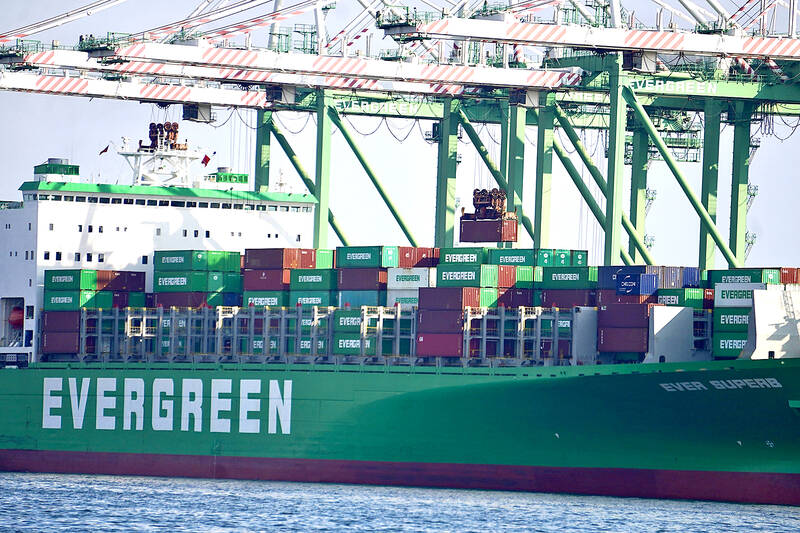Export orders expanded by 10.8 percent annually last month, the highest year-on-year growth in two years, thanks to robust demand for chips used in artificial intelligence (AI) and high-performance computing (HPC) devices mainly from Nvidia Corp, the Ministry of Economic Affairs said yesterday. It also outpaced the ministry’s upper estimate of 5.88 percent annual growth.
Export orders rose from US$42.49 billion in April last year to US$47.1 billion last month, while export orders dropped by 0.1 percent from US$47.16 billion on a monthly basis, the ministry said.
The ministry said it expects the growth momentum to carry into this month and export orders to rise between 1.8 percent and 6.2 percent annually to between US$46.5 billion and US$48.5 billion, as AI chip demand remains vigorous.

Photo: CNA
“April’s stronger performance and the growth prospects for May gave us higher confidence that export orders in the second quarter would return to growth on an annual basis, as compared with our initial estimate at the beginning of this year,” Department of Statistics Director Huang Yu-ling (黃于玲) said via telephone.
Electronic products orders soared by 22.7 percent year-on-year to US$17.1 billion last month, primarily fueled by robust demand for foundry services, chip distribution and printed circuit boards for AI-related applications and HPC devices, the ministry said. Orders from the US grew at the fastest pace of 35.8 percent.
Orders for information and communications technology products last month rose 8.4 percent annually to US$13.05 billion, backed by increased server orders on resilient demand for AI applications and cloud-based devices. Orders from Malaysia grew the highest at 53.3 percent, as manufacturers shifted production from China to the Southeast Asian country amid the US-China technology dispute.
Optoelectronics products orders expanded 13.5 percent annually to US$1.66 billion last month, attributable to increases in orders for TV panels and optoelectronic cameras. TV panel prices have also seen sustained high levels.
The price of 65-inch TV panels is to climb 1.1 percent month-on-month, or US$2 per unit, this month, extending price hikes over the past few months, market researcher TrendForce Corp (集邦科技) said yesterday.
Three major traditional sectors returned to growth last month, driven by more marked restocking demand.
Orders for basic metals, mainly for steel, rose by 3.5 percent year-on-year to US$2.23 billion last month mainly due to restocking demand, the ministry said.
Plastics product orders increased 4.2 percent annually to US$1.61 billion on inventory buildup demand, the ministry said, adding that prices were supported by higher raw material prices.
Petrochemical products orders rose by 8 percent year-on-year last month to US$1.54 billion, as OPEC increased global crude oil prices by 5.9 percent year-on-year, the ministry said.
Machinery orders shrank 3.4 percent year-on-year to US$1.59 billion last month, because increases in equipment spending from semiconductor companies were still not enough to offset the broader weakness in capacity expansion amid a slow global economic recovery, the ministry said.

The Eurovision Song Contest has seen a surge in punter interest at the bookmakers, becoming a major betting event, experts said ahead of last night’s giant glamfest in Basel. “Eurovision has quietly become one of the biggest betting events of the year,” said Tomi Huttunen, senior manager of the Online Computer Finland (OCS) betting and casino platform. Betting sites have long been used to gauge which way voters might be leaning ahead of the world’s biggest televised live music event. However, bookmakers highlight a huge increase in engagement in recent years — and this year in particular. “We’ve already passed 2023’s total activity and

Nvidia Corp CEO Jensen Huang (黃仁勳) today announced that his company has selected "Beitou Shilin" in Taipei for its new Taiwan office, called Nvidia Constellation, putting an end to months of speculation. Industry sources have said that the tech giant has been eyeing the Beitou Shilin Science Park as the site of its new overseas headquarters, and speculated that the new headquarters would be built on two plots of land designated as "T17" and "T18," which span 3.89 hectares in the park. "I think it's time for us to reveal one of the largest products we've ever built," Huang said near the

China yesterday announced anti-dumping duties as high as 74.9 percent on imports of polyoxymethylene (POM) copolymers, a type of engineering plastic, from Taiwan, the US, the EU and Japan. The Chinese Ministry of Commerce’s findings conclude a probe launched in May last year, shortly after the US sharply increased tariffs on Chinese electric vehicles, computer chips and other imports. POM copolymers can partially replace metals such as copper and zinc, and have various applications, including in auto parts, electronics and medical equipment, the Chinese ministry has said. In January, it said initial investigations had determined that dumping was taking place, and implemented preliminary

Intel Corp yesterday reinforced its determination to strengthen its partnerships with Taiwan’s ecosystem partners including original-electronic-manufacturing (OEM) companies such as Hon Hai Precision Industry Co (鴻海精密) and chipmaker United Microelectronics Corp (UMC, 聯電). “Tonight marks a new beginning. We renew our new partnership with Taiwan ecosystem,” Intel new chief executive officer Tan Lip-bu (陳立武) said at a dinner with representatives from the company’s local partners, celebrating the 40th anniversary of the US chip giant’s presence in Taiwan. Tan took the reins at Intel six weeks ago aiming to reform the chipmaker and revive its past glory. This is the first time Tan